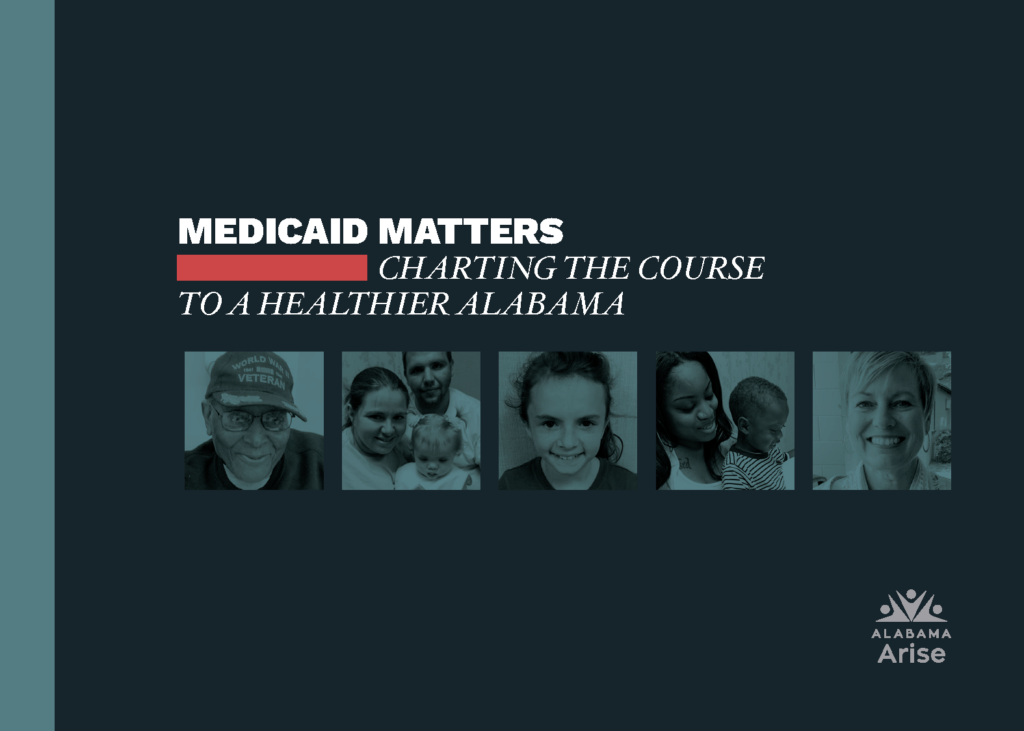Introduction
ALABAMA MEDICAID supports the health care system that serves us all. Whether you have employer health coverage, a private plan, public insurance like Medicaid or Medicare, or no coverage at all, you will likely benefit at some point from facilities and services that Medicaid makes possible.
More than a million Alabamians — mostly children in families with low incomes, seniors in long-term care and people with disabilities — have Medicaid coverage that allows them to get the regular, timely medical care they need. By building on this foundation to make affordable coverage more widely available, we can strengthen our health system, our workforce, our communities and our economy.
This report looks at Alabama Medicaid from four angles: how it works now, how it’s improving coverage, who’s still left out and how we can make it stronger.
Click on the icons below to read each section of our report. Please continue below the icons for our conclusion, editor’s note and acknowledgments. You can click any image in this report to enlarge it. To read our news release on the report, click here.




Conclusion
All Alabamians deserve the opportunity to get the health care they need to survive and thrive. Medicaid is a lifeline for one in four Alabamians and an economic engine for communities across our state. Extending Medicaid coverage to adults with low incomes would make life better for Alabamians of all races, genders, hometowns and incomes — and it would only cost the state a dime on the dollar. Here’s why Medicaid expansion is a bargain Alabama can’t afford to pass up:
Medicaid expansion would ensure health coverage for:
- People who work low-wage jobs and can’t afford private coverage
- Workers who are between jobs
- Adults caring for children or other family members at home
- People who have disabilities and are awaiting SSI determinations
- College students
- Uninsured veterans
- People harmed by racial and ethnic health disparities
Medicaid expansion would help more Alabamians have:
- Regular primary care and preventive checkups
- Earlier detection and treatment of serious health problems
- Regular OB/GYN visits without referral
- Less dependence on costly emergency care
- Better health and greater financial peace of mind
Medicaid expansion would bring our federal tax dollars home to support:
- Better outcomes on critical health challenges like infant mortality, obesity and substance use disorders
- Stronger rural hospitals and clinics
- A stronger network of community mental health and substance use disorder services
- A needed boost in jobs and revenue for state and local economies
Editor’s note
As we publish this report, Alabama and the world are facing the public health emergency of the COVID-19 pandemic. The duration and fallout of the crisis are impossible to predict, but every level of our health care system will be severely tested in the months ahead. The pandemic is taking a disproportionate toll on African American and Latino communities where people are more likely to live in poverty and without health insurance. And the number of uninsured Alabamians — already shockingly high before the pandemic — will continue to grow as unemployment mounts.
In times like these, state leaders play a crucial role in protecting the public from physical, mental and financial harm. One of the most important tools available to both elected officials and their constituents is accurate information about how state services promote the common good — and how we can make them stronger.
While this report took shape before the COVID-19 crisis erupted, we hope it will help Alabamians understand the available health care solutions and their important economic benefits. Emergencies demand rapid response, and an understanding of the “preexisting conditions” in our state’s health care system can make those responses more appropriate and more effective.
Through this pandemic and the next one — and the more ordinary times in between — all Alabamians will depend on a health care system with Alabama Medicaid at its core. The stronger Medicaid is, the better the prognosis for all of us will be.
The COVID-19 emergency has brought several temporary changes to the information in this report, including the following:
Section 1
Silvia Hernandez has suspended services at Go Play Therapy but hopes to reopen after the economy stabilizes.
Section 1
Congress has increased the federal share of Medicaid funding for all states by 6.2 percentage points for the length of the pandemic. Some lawmakers have proposed further increases.
Section 2
If someone had Medicaid coverage during March 2020, Alabama will not end that coverage during the pandemic unless the person cancels it or moves out of state. This temporary halt to coverage cuts includes people receiving postpartum coverage that normally ends after 60 days.
Acknowledgments
This Alabama Arise report was made possible by a generous grant from The Women’s Fund of Greater Birmingham. The findings and conclusions presented in this report are those of Arise and do not necessarily reflect the opinions of The Women’s Fund.
Arise policy director Jim Carnes was the primary author of this report, and Valerie Downes of Montgomery designed it. Arise communications associate Matt Okarmus interviewed many of the individuals profiled in this report. Other report editors and contributors included Arise executive director Robyn Hyden; communications director Chris Sanders; policy analyst Carol Gundlach; organizing director Presdelane Harris; organizers Stan Johnson, Mike Nicholson and Debbie Smith; and intern Kayla Thompson.
Special thanks to Jesse Cross-Call and Tammie Smith at the Center on Budget and Policy Priorities and Stephen Eisele and Paul Gels at Community Catalyst for their guidance and support.



